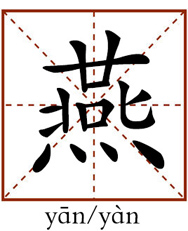Yan

This character has two tones, yān and yàn. When it is pronounced as yān, it is the name of an ancient kingdom or a surname. When pronounced as yàn, it refers to swallows. When used as an adjective, it has a sense of ease and happiness.
燕昭市骏
yān zhāo shì jùn
Yan zhao refers to Duke Zhao of Yan (335–279 BCE), a ruler of the State of Yan beginning in the Western Zhou Dynasty and thriving during the Spring and Autumn Period and the Warring States Period (770–221 BCE). Shi means to buy and jun refers to horses. It indicates that only with sincerity and respect may one succeed in recruiting talented people to work for them.
This proverb originated from a story about Duke Zhao of Yan recruiting Guo Wei (351–297 BCE). Duke Zhao of Yan wanted to find excellent people to serve him and came to visit Guo Wei for help. Guo told him a story, in which a king put a bounty of 1,000 pieces of gold for the acquisition of the horses, but received nothing over three years. One of his servants set out to seek good horses and he got one after three months, but the horse was dead. The servant spent 500 pieces of gold to bring its body back, annoying the king. The servant said, “Your Majesty, if the public knew that you were willing to spend a lot of money on a dead horse, they would trust you that you are going to pay more for a live one. Then they may strive to search for fine horses for you.” Just as expected, three noble steeds were sent to the king within one year. After telling the story, Guo volunteered to serve Duke Zhao of Yan, saying, “Your Majesty, if you recruit me to the court, there will be more people better and wiser than me coming to apply for the opportunity to serve for you.”
Finally, Guo was recruited by Duke Zhao and was honored as the duke’s teacher. Moved by what Duke Zhao did, many outstanding people came to the State of Yan to serve him, including the brilliant tactician Yue Yi and the famous philosopher Zou Yan.
Today, the proverb often implies that people should treat their employees well and with respect, and only in this way can they find good employees to work with.
(edited by REN GUANHONG)
